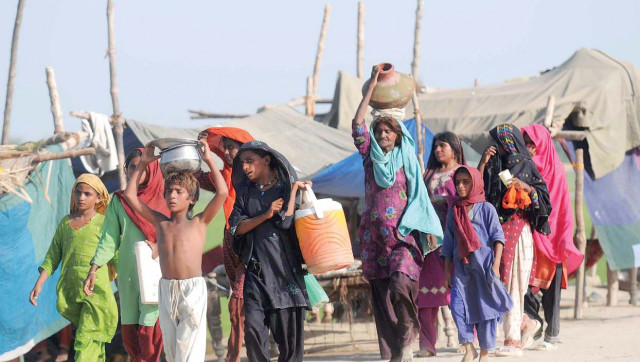UN fears food shortage, demands assistance
The UN food agency has said its goal is to feed six million flood victims by next month.

UN fears food shortage, demands assistance
The UN food agency assures that it will reach its target of feeding six million flood victims by next month. But the agency is concerned about the possibility of a food supply shortage in the upcoming months, which would limit some vital components in the food basket such as oil and pulses.
“There will be a large number of people who will need food and for that we need cash,” said David Kaatrud, WFP director of emergencies.
“This emergency is beyond the capacity of just the UN. The government needs to take the lead. The WFP needs tremendous help and support and the donors need to facilitate our efforts as soon as possible. There are in-country stocks for the upcoming months and we can do local purchases provided we have the cash. However, due to the shortage we might have to make international purchases and we are getting the message out for cash donations. Currently, we are lacking millions of dollars,” Kaatrud told The Express Tribune.
Other agencies are concerned about malnutrition due to the shortage of food supplies. Before the crisis, malnutrition was around 13 per cent in Pakistan. Now it has gone up to 14 per cent post crisis.
“There is a surveillance survey still ongoing which will soon show a better picture of the statistics,” Kaatrud told The Express Tribune. The WFP is also planning to launch an operation to target and cater to the emerging problem of malnutrition.” he added.
“The situation is not over and the emergency is still there,” said Eric LaRoche, assistant director-general, Health Action in Crisis, World Health Organisation (WHO). The agency believes that there is a need for urgent airlift assistance and the north should not lose focus. “Children are still under threat from malnutrition and the mechanism of coordination needs to be enhanced in order to not increase the mortality rate. The risk of malnutrition still persists even if the people go back to their homes,” added LaRoche.
Unicef highlights the attention being drawn towards all the stakeholders including the concerned ministries of their work regarding sanitation and water supply challenges. “If we don’t scale up our efforts to prevent malnutrition we are facing increased mortality rates,” said Louis-Georges Arsenault, Director of Emergency Programmes Unicef.
“This a time for everyone to come together and step up, we can turn the tragedy into an opportunity, especially in Sindh,” added Arsenault.
Kaatrud said that the agency started emergency response when flooding started and it has been highly dynamic as the water is still flowing in some areas of Pakistan. However, there are different set-ups and right now the agency will relocate its operations from the north to the south. “The focus has not shifted to early recovery. We still need to mobilise our resources with help from our partners”.
Published in The Express Tribune, September 25th, 2010.



















COMMENTS
Comments are moderated and generally will be posted if they are on-topic and not abusive.
For more information, please see our Comments FAQ